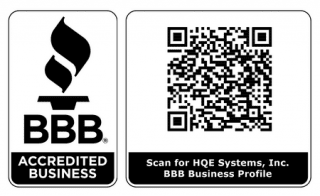The hospitality industry is synonymous with luxury and comfort, but ensuring the safety and security of guests and staff presents various challenges. From cyber threats to natural disasters, hotels and resorts must navigate a complex security landscape. This comprehensive guide explores effective strategies for addressing these challenges, highlighting HQE Systems’ innovative solutions. By integrating advanced technologies, HQE Systems helps hospitality venues enhance security measures, protect sensitive data, and ensure a safe environment for all. This blog will delve into the critical aspects of hospitality security and showcase how cutting-edge solutions can elevate safety standards.
Ensuring the safety and security of guests and staff in the hospitality industry is a complex task. Hotels, resorts, and entertainment venues face the challenge of managing large volumes of guests while securing vast properties. This involves not only protecting physical assets but also safeguarding personal data and maintaining a welcoming atmosphere. Effective security measures are crucial to addressing these needs, from advanced surveillance systems to comprehensive cybersecurity protocols.
Robust security measures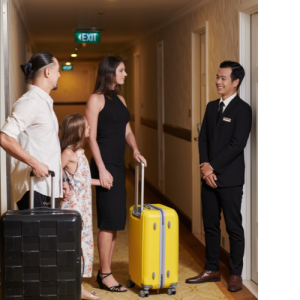 directly impact guest experience and satisfaction. When guests feel safe, they are more likely to enjoy their stay and return in the future. High standards of security also build trust and loyalty, enhancing the overall reputation of the hospitality establishment. By investing in cutting-edge security technologies and continuous staff training, hospitality venues can provide a seamless and secure environment. This holistic approach to security not only ensures protection but also significantly contributes to increased guest satisfaction and brand loyalty, setting a standard that guests come to expect and appreciate.
directly impact guest experience and satisfaction. When guests feel safe, they are more likely to enjoy their stay and return in the future. High standards of security also build trust and loyalty, enhancing the overall reputation of the hospitality establishment. By investing in cutting-edge security technologies and continuous staff training, hospitality venues can provide a seamless and secure environment. This holistic approach to security not only ensures protection but also significantly contributes to increased guest satisfaction and brand loyalty, setting a standard that guests come to expect and appreciate.
Implementing these measures requires a commitment to ongoing evaluation and adaptation to emerging threats, ensuring that the hospitality industry can consistently offer a secure and enjoyable experience for all guests.
The hospitality industry faces several critical security challenges that require comprehensive and adaptive solutions. These challenges range from cybersecurity threats to physical vulnerabilities, each demanding robust strategies to protect guests, staff, and assets.
Data Breaches and Cybersecurity Threats:
With the increasing amount of personal data processed by hotels and resorts, these establishments are prime targets for cyber threats. Sensitive information such as credit card details, personal identification, and booking histories are valuable assets for cybercriminals. To combat these threats, hospitality businesses must implement robust cybersecurity measures. This includes using advanced encryption techniques, regularly updating software to patch vulnerabilities, and conducting frequent security audits. Training staff on data protection practices is essential to prevent breaches caused by human error. Maintaining a strong cybersecurity posture is crucial to protect guest information and maintain trust.
Physical Threats and Vulnerabilities:
Physical security threats in the hospitality industry include unauthorized access, internal theft, and vandalism. Hotels and resorts often have multiple entry points and extensive facilities, making them susceptible to intrusions. Unauthorized access can lead to theft, harm to guests, and damage to property. To mitigate these risks, effective access control systems are vital. This includes key card access for guest rooms, surveillance cameras in strategic locations, and security personnel to monitor and respond to incidents. Internal theft by staff members is another concern, necessitating thorough background checks during hiring and implementing measures to monitor high-risk areas such as storage rooms and cash handling points.
Compliance and Regulatory Challenges:
The hospitality industry is subject to various safety and privacy regulations, which can vary significantly by region. These regulations are designed to protect guests and staff but can pose compliance challenges for businesses. Non-compliance can result in legal and financial penalties, as well as reputational damage. To navigate these complexities, hospitality establishments must develop adaptable compliance strategies. This includes staying informed about relevant laws and regulations, conducting regular compliance audits, and ensuring all security practices meet the required standards. Implementing comprehensive training programs for staff on regulatory requirements and best practices is also crucial.
Addressing these challenges requires a multifaceted approach that combines technology, staff training, and adherence to regulatory standards. By doing so, the hospitality industry can create a secure environment that protects both guests and employees while maintaining operational efficiency.
Understanding Fire Risks: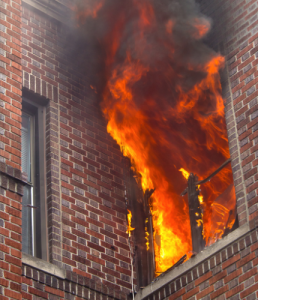
Fire risks in the hospitality industry stem from various sources, including electrical issues, cooking fires, heating equipment, and flammable materials. These risks are exacerbated by the presence of multiple guests and staff, increasing the likelihood of accidents.
Preparation and Planning:
Comprehensive fire safety protocols are essential to mitigate these risks. This includes regular inspections to identify potential hazards, routine maintenance of electrical systems, and ensuring that all fire safety equipment is functional. Conducting fire drills ensures that staff and guests are well-prepared in the event of an emergency, reducing panic and facilitating efficient evacuations.
Infrastructure and Safety Measures:
Implementing robust fire safety measures is critical. This includes installing smoke detectors in all guest rooms and common areas, ensuring that sprinkler systems are in place and operational, and clearly marking all emergency exits. These measures can significantly reduce the impact of a fire by providing early warnings and enabling swift responses.
Case Example:
The importance of robust fire safety measures was starkly highlighted by the recent incident at a historic hotel in Marysville, California. The hotel suffered significant damage due to a fire, underscoring the vulnerabilities of such properties to fire risks. Just days after this tragic event, a nearby historic theater was vandalized, further illustrating the security challenges faced by iconic establishments in the hospitality industry. These incidents emphasize the need for comprehensive fire safety protocols and the implementation of advanced safety measures to protect both property and lives (CBS News, 2023).
In conclusion, addressing fire safety challenges in the hospitality industry requires a multifaceted approach that includes understanding the risks, implementing rigorous safety protocols, and ensuring that all infrastructure is equipped with the necessary safety measures. By doing so, hospitality establishments can protect their guests, staff, and properties from the devastating effects of fires.
The hospitality industry must be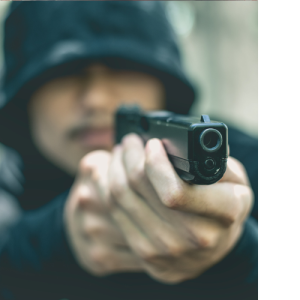 prepared for the possibility of an active shooter scenario to ensure the safety of guests and staff. Developing a comprehensive response plan is crucial. This plan should include training staff to recognize potential threats and implement lockdown procedures. Regular drills and simulations are essential for helping staff understand their roles during an emergency, reducing panic, and ensuring a swift response.
prepared for the possibility of an active shooter scenario to ensure the safety of guests and staff. Developing a comprehensive response plan is crucial. This plan should include training staff to recognize potential threats and implement lockdown procedures. Regular drills and simulations are essential for helping staff understand their roles during an emergency, reducing panic, and ensuring a swift response.
Coordination with local law enforcement is vital. Establishing a strong relationship with law enforcement agencies allows for quicker response times and more effective management of the situation. Hotels and resorts should also have clear communication channels to promptly alert guests and staff in the event of an emergency. This communication should be both audible and visible to ensure it reaches everyone, including those with disabilities.
Clear signage indicating emergency exits and safe areas can aid in quickly directing guests to safety. Additionally, conducting risk assessments to identify vulnerable areas within the property can help in fortifying those points and planning effective evacuation routes. Staff should be trained in crisis communication to manage guest queries and concerns efficiently during a crisis.
Hotels should also create safe rooms or areas where guests and staff can shelter in place if evacuation is not possible. These areas should be equipped with basic necessities such as first aid kits, water, and communication tools. Regularly updating and rehearsing the emergency response plan ensures that all staff members are prepared to act quickly and effectively, thereby enhancing overall safety.
By focusing on these proactive measures, the hospitality industry can better prepare for and mitigate the risks associated with active shooter scenarios, ultimately ensuring a safer environment for both guests and staff.
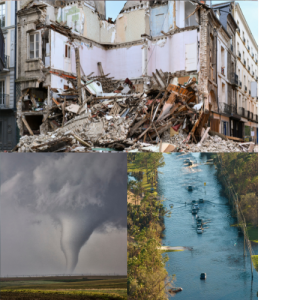
Hotels may face various natural disasters, including earthquakes, hurricanes, floods, wildfires, and tornadoes. Each disaster type poses unique challenges; for instance, hurricanes and floods can cause extensive water damage and disrupt utilities, while earthquakes can compromise the structural integrity of buildings. Wildfires threaten properties with direct fire damage and smoke, while tornadoes can cause severe structural damage and pose a significant safety risk to guests and staff.
Disaster preparedness is crucial for hotels to ensure guest safety and minimize property damage. This involves creating comprehensive disaster preparedness plans that outline emergency procedures, communication protocols, and evacuation routes. Regular training and drills for staff are essential to ensure everyone is familiar with their roles during an emergency. These plans should be updated regularly based on new information and changing conditions.
Hotels can enhance their resilience to natural disasters through various infrastructural measures. Building designs should comply with local building codes that account for natural disaster risks. For example, properties in earthquake-prone areas should be constructed with seismic-resistant materials and designs. Installing hurricane shutters, flood barriers, and fire-resistant materials can help protect against specific disasters. Additionally, securing outdoor furniture and equipment can prevent damage and injury during high winds.
Maintaining well-stocked emergency supplies is critical for hotel disaster preparedness. This includes having an adequate supply of water, non-perishable food, first aid kits, blankets, and essential medications. Backup power systems, such as generators, are crucial to keep critical systems like lighting, communication, and refrigeration operational during power outages. Hotels should also ensure they have a reliable communication system to keep in touch with local authorities and emergency services.
By understanding the risks, planning effectively, building resilient infrastructure, and maintaining emergency supplies, hotels can better manage the impacts of natural disasters, ensuring the safety and well-being of their guests and staff.
Having discussed the various security challenges faced by the hospitality industry, it’s clear that advanced solutions are essential. HQE Systems offers cutting-edge technologies specifically designed to enhance security and safety in hospitality environments. Our integrated emergency mass notification systems, advanced AI surveillance with predictive analytics, and robust cybersecurity measures provide comprehensive protection. By leveraging these innovative solutions, hotels and resorts can ensure the safety of their guests and staff, safeguard valuable data, and maintain a secure, welcoming atmosphere. HQE Systems stands as a trusted partner in elevating hospitality security standards through technology and expertise.
Integrated Emergency Mass Notification Systems:
HQE Systems offers real-time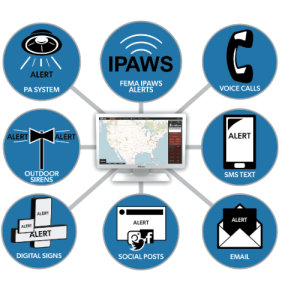 communications solutions that are crucial during emergencies. These integrated mass notification systems operate across multiple platforms, including mobile devices, public address systems, and digital signage. This ensures that all guests and staff are promptly informed of any emergency, enabling swift and coordinated responses. The ability to deliver clear, concise messages in real-time minimizes confusion and enhances safety during critical incidents.
communications solutions that are crucial during emergencies. These integrated mass notification systems operate across multiple platforms, including mobile devices, public address systems, and digital signage. This ensures that all guests and staff are promptly informed of any emergency, enabling swift and coordinated responses. The ability to deliver clear, concise messages in real-time minimizes confusion and enhances safety during critical incidents.
Advanced AI Surveillance:
HQE’s advanced AI surveillance systems utilize predictive analytics to preemptively identify and mitigate potential threats. These systems continuously monitor for unusual behavior or activities that may indicate a security risk. By analyzing patterns and behaviors, the AI can alert security personnel to potential issues before they escalate.
Cybersecurity Enhancements:
In an era where data breaches are increasingly common, HQE Systems prioritizes the protection of sensitive guest information. Our cybersecurity solutions feature end-to-end encryption and advanced threat detection systems. End-to-end encryption ensures that data transmitted between devices is secure and cannot be intercepted by unauthorized parties. Advanced threat detection systems continuously monitor for suspicious activity and potential cyber threats, enabling swift action to neutralize risks. By safeguarding guest data, these measures help maintain trust and protect the reputation of hospitality establishments.
HQE Systems’ advancements in security technology provide a comprehensive and integrated approach to hospitality security. By leveraging these cutting-edge solutions, hotels and resorts can ensure a safe and secure environment, enhancing guest satisfaction and operational efficiency.
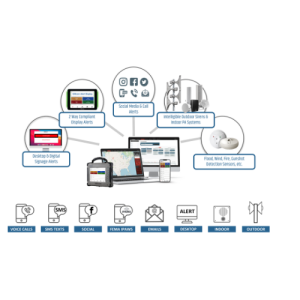
Incorporating HQE’s advanced security solutions into hospitality security strategies involves a systematic approach. Start by conducting a comprehensive security assessment to identify vulnerabilities and specific needs. Based on this assessment, integrate HQE’s systems, which may include surveillance cameras, access control systems, and alarm systems. These systems should be seamlessly connected to a central monitoring station to ensure real-time data collection and analysis. Utilize HQE’s advanced analytics to monitor patterns and detect potential threats. Regularly update the software and firmware of these systems to protect against evolving security threats.
Proper training is essential for staff to effectively utilize HQE’s security technologies. Organize regular training sessions to familiarize employees with the operation and maintenance of the systems. This should include hands-on training for using surveillance equipment, managing access controls, and responding to alarms. Develop comprehensive training materials and manuals that detail the functionalities of HQE systems. Encourage continuous learning by providing updates on new features and best practices. Additionally, foster a culture of security awareness among staff, emphasizing the importance of vigilance and prompt reporting of suspicious activities.
In conclusion, integrating HQE’s advanced security systems and ensuring thorough training and awareness among staff are critical steps in enhancing the overall security strategy of any hospitality establishment. This proactive approach not only safeguards guests and assets but also enhances the reputation of the hospitality provider as a secure and reliable entity.
Case Study 1: Major Hotel Chain Security Overhaul
In 2023, a leading international hotel chain recognized the need for a comprehensive security overhaul to address increasing security threats and ensure guest safety. Partnering with HQE Systems, the hotel chain implemented a multi-faceted security solution across its properties worldwide.
hotel chain recognized the need for a comprehensive security overhaul to address increasing security threats and ensure guest safety. Partnering with HQE Systems, the hotel chain implemented a multi-faceted security solution across its properties worldwide.
HQE Systems began by installing advanced AI surveillance systems capable of real-time monitoring and predictive analytics. These systems continuously scanned for unusual behavior and potential threats, providing early warnings to security personnel. The integration of these AI-powered cameras drastically reduced instances of unauthorized access and internal theft.
The next phase involved upgrading the hotel’s access control systems. Traditional key cards were replaced with biometric access controls, enhancing security while providing a seamless experience for guests. These biometric systems ensured that only authorized individuals could access secure areas, significantly reducing the risk of unauthorized entry.
Additionally, HQE Systems deployed their integrated emergency mass notification systems. These systems enabled the hotel chain to communicate effectively with guests and staff during emergencies through multiple platforms, including mobile alerts and digital signage. This ensured timely and accurate dissemination of information, enhancing the overall safety and security response.
The cybersecurity measures were also bolstered with HQE Systems’ end-to-end encryption and advanced threat detection solutions. By protecting sensitive guest data from cyber threats, the hotel chain maintained its reputation for safety and reliability. The comprehensive security overhaul led to a significant improvement in guest satisfaction and a notable decrease in security incidents across all properties.
Case Study 2: Boutique Hotel’s Security Integration
A boutique hotel located in a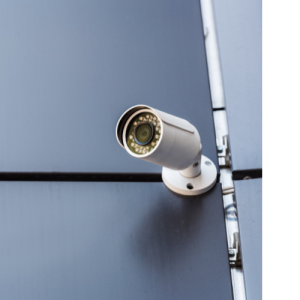 bustling urban area faced unique security challenges due to its smaller size and exclusive clientele. In 2023, the hotel partnered with HQE Systems to enhance its security infrastructure while maintaining its personalized guest experience.
bustling urban area faced unique security challenges due to its smaller size and exclusive clientele. In 2023, the hotel partnered with HQE Systems to enhance its security infrastructure while maintaining its personalized guest experience.
HQE Systems started by conducting a thorough security assessment to identify potential vulnerabilities. Based on the findings, advanced surveillance cameras with facial recognition technology were installed at key entry points. This allowed for discreet yet effective monitoring of all individuals entering and exiting the premises.
The boutique hotel also adopted HQE Systems’ integrated emergency mass notification system. This system ensured that all guests and staff could be promptly informed of any emergencies, minimizing disruption and ensuring swift action. Mobile alerts were particularly effective, allowing the hotel to maintain a high level of communication without compromising the intimate atmosphere.
To address data security, HQE Systems implemented their cybersecurity enhancements, including end-to-end encryption and real-time threat detection. These measures protected the hotel’s sensitive information and provided peace of mind to both guests and management.
The integration of HQE Systems’ solutions not only enhanced the boutique hotel’s security but also elevated the overall guest experience. Guests appreciated the seamless and unobtrusive security measures, which allowed them to enjoy their stay without concerns about safety.
By partnering with HQE Systems, both the major hotel chain and the boutique hotel successfully addressed their unique security challenges, ensuring a safe and secure environment for their guests and staff.
Embracing the Future: HQE Systems Redefines Hospitality Security
As we look ahead, HQE Systems is poised to revolutionize security in hospitality through advanced technologies like predictive analytics and IoT integration.
Predictive Analytics and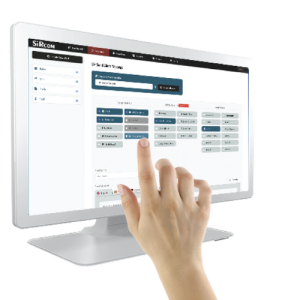 Security: HQE Systems’ adoption of predictive analytics stands to transform security operations in hospitality. By analyzing historical data and real-time information, predictive models can foresee potential threats before they escalate. This proactive approach not only enhances guest safety but also allows for preemptive security measures, ensuring a seamless and secure experience for patrons.
Security: HQE Systems’ adoption of predictive analytics stands to transform security operations in hospitality. By analyzing historical data and real-time information, predictive models can foresee potential threats before they escalate. This proactive approach not only enhances guest safety but also allows for preemptive security measures, ensuring a seamless and secure experience for patrons.
Integration of IoT by HQE Systems: The integration of IoT devices holds immense potential to bolster security monitoring in hospitality settings. By connecting diverse devices—from CCTV cameras to access control systems—HQE Systems enables comprehensive and centralized management. Real-time data from IoT sensors can detect anomalies, monitor guest traffic patterns, and streamline emergency response protocols. This interconnected network not only enhances situational awareness but also facilitates rapid, targeted interventions in critical situations.
In summary, HQE Systems’ commitment to integrating predictive analytics and IoT technologies signifies a paradigm shift in hospitality security. By leveraging these innovations, hotels, resorts, and entertainment venues can proactively safeguard guests and assets while optimizing operational efficiencies. As the industry evolves, HQE Systems remains at the forefront, ensuring that hospitality venues maintain a secure environment conducive to exceptional guest experiences.
Innovative Solutions for Tomorrow: HQE Systems’ Vision for Hospitality Security
In transforming hospitality security, HQE Systems pioneers a new era marked by proactive safety measures and operational efficiencies. By harnessing predictive analytics and IoT integration, HQE Systems not only enhances guest safety but also empowers venues to deliver exceptional experiences with peace of mind. The seamless integration of these technologies ensures that hospitality leaders can anticipate and mitigate risks effectively, fostering a secure and welcoming environment for all.
Summary of Key Points: HQE Systems’ innovative approach includes predictive analytics for preemptive security measures and IoT integration for comprehensive monitoring and rapid response.
Call to Action: Embrace the future of hospitality security with HQE Systems’ advanced solutions to safeguard guests and elevate operational standards.
Looking Ahead: As technological advancements continue, HQE Systems remains committed to pioneering solutions that redefine hospitality security. The journey forward promises continued innovation and enhanced capabilities to meet evolving industry needs and ensure unparalleled safety and service excellence.
This conclusion not only summarizes the impact of HQE Systems’ technologies but also sets the stage for future developments in hospitality security.

HQE Systems is a certified Veteran Owned Company. For more information about HQE Systems Inc. and its emergency management, electronic security, and integration solutions, please visit www.hqesystems.com.

Contact: David Ditto (Early Warning Systems Subject Matter Expert)
Email: David.Ditto@hqesystems.com
Phone Number: (843) 872-7020
____________________
HQE Systems, Inc. | HQE is a Minority-Owned Service Disabled Veteran Owned Small Business (SDVOSB) providing full solutions for: Mass Notification Systems, Electronic Security Systems, Software Development Services, Contract Support, and Prototyping Services. As a brand-agnostic solutions provider, HQE prides itself in providing the BEST solution for the project. HQE possesses over 30+ factory certifications and reseller licenses to ensure our clients receive the highest quality service at the ideal budget. HQE can provide full design, installation, integrations, upgrades, and long-term maintenance support for any size and scope project.
